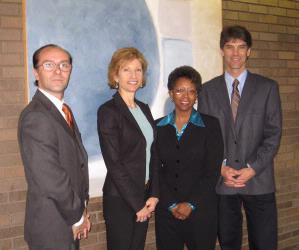Health Economist Delivers Annual Grollman Lecture
UCSF researcher discusses the clinical, economic, and policy challenges and opportunities of personalized medicine

By Becky Ceraul
May 5, 2009
Kathryn A. Phillips, PhD, a professor of health services research and health economics at the University of California, San Francisco (UCSF), visited the University of Maryland School of Pharmacy on April 29 where she delivered the School’s annual Ellis S. Grollman Lecture in the Pharmaceutical Sciences. As the director of the Center for Translational and Policy Research on Personalized Medicine at UCSF, Phillips focuses on the impact of personalized medicine and targeted therapies on clinical care, health economics, and health policy.
“Dr. Phillips has an extensive list of accomplishments in improving health care,” said Paul Shapiro, PhD, the School of Pharmacy’s associate dean for research and graduate studies in his introduction. “She serves on numerous advisory boards for government and non-government organizations, on several editorial boards for scientific journals and has over 100 publications. She is a principal investigator on a multi-million dollar NIH grant with a goal to use an integrated and interdisciplinary approach to obtain evidence about key aspects of the translation of genomic information for breast and colorectal cancers and to apply that to clinical practice and policy.”
According to Phillips, personalized medicine is the enhanced ability to individualize health care now that we know more about genomics and falls into two categories: genetic testing to determine risk and the use of genetic information for treatment decisions and drug development.
The rise of diagnostic tests is a major trend in genomics. “Historically, health care has focused primarily on developing drugs through a very stringent review process. Now we have diagnostics based on genomics, which are very expensive to administer but aid in making critical health care decisions, such as genetic tests for certain types of cancer. These tests have very little regulation,” Phillips said.
Balancing regulation and innovation is a challenge in the field of personalized medicine. “The issue is whether or not the Food and Drug Administration should minimally or extensively regulate diagnostics,” Phillips said.
Diagnostics are also viewed very differently from drugs in the reimbursement world. “Many of the tests are not covered by Medicare and its decisions often drive coverage decisions made in the industry,” said Phillips. “Many people also think that diagnostics should be treated the same as drugs and undergo the randomized clinical trial process to demonstrate their clinical utility.”
Phillips concedes that there is a lot of “hype” about personalized medicine and that a lot of what we hear isn’t going to come true anytime soon. “But on the other hand, if you look at what we are learning about genomics and the way health care is moving in general, I believe it is inevitable that we are going to have greater stratification and targeting, which has implications across the board no matter what field you are in. This whole paradigm shift is going to change health care in many ways.”
Ellis Grollman was a 1926 graduate of the University of Maryland School of Pharmacy. He practiced as a hospital pharmacist at Johns Hopkins and Sinai Hospitals in Baltimore City and as a community pharmacist in Frederick, Ocean City, Gaithersburg and Annapolis. Mr. Grollman died in 1982. The Ellis Grollman Lecture in the Pharmaceutical Sciences was established in 1983 by his sister, Mrs. Evelyn Grollman Glick, as an endowed memorial. It brings outstanding leaders in the pharmaceutical and related basic sciences to speak to the School’s students and faculty.
